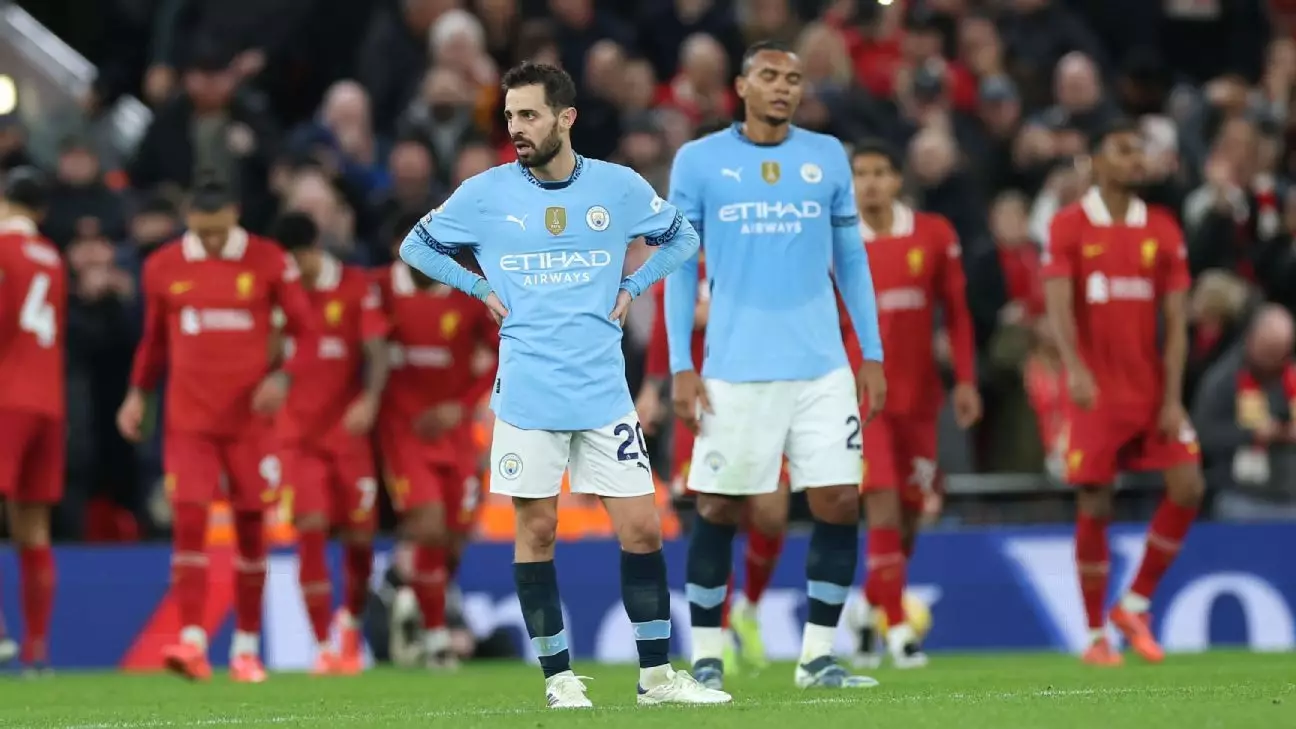The football world is a merciless place, where the rise and fall of clubs can occur with dizzying speed. Manchester City, a club that dominated English football not too long ago, is now faced with the weight of its own history and the repercussions of negligence regarding squad evolution. The signs of decay are becoming increasingly apparent, serving as a cautionary tale for contemporary giants like City, who now find themselves grappling with the next phase in their journey.
Successful teams are often shackled by their past achievements. For Manchester City, the echoes of their recent dominance—six league titles in seven years and a Champions League victory—are a distant murmur amidst current challenges. As the club suffered a staggering defeat against Liverpool, it became clear that the glory days may be over. City’s glory was not achieved without an arsenal of talent, led by tactical wizard Pep Guardiola. However, the reluctance to adapt to the evolving demands of Premier League football has positioned City precariously on the edge of decline, much like the previous titans of football, Manchester United and Liverpool.
In the aftermath of legendary managers like Sir Alex Ferguson and the enduring legacy of Bill Shankly, these clubs were lulled into a false sense of security. City is now treading similar waters. Just as United assumed they would swiftly reclaim their former glory after Ferguson’s exit, City appears to be blind to the necessity for transformation in their squad, evidenced by their recent form.
Manchester City’s shortcomings in player recruitment and management reflect a deep-seated issue being replicated across several clubs that once basked in old glories. The presence of ageing key players such as Kevin De Bruyne, who has faced significant injuries in recent times, poses a substantial risk if suitable replacements are not sought in time. The same applies to veterans like Kyle Walker and İlkay Gündoğan, both crucial components in City’s success yet unable to replicate their past performances consistently.
Analyses reveal that it is not merely the individuals that have faltered; rather, it is the collective failure to renew the squad with fresh talent. Gündoğan’s recent return from Barcelona paints a startling picture; while once a linchpin in Guardiola’s tactics, he appears to struggle under the physical demands of the Premier League. This phenomenon is mirrored in the league’s trend of performance diminishment as key players age without the infusion of younger talent to sustain competitive intensity.
Moreover, expensive signings such as Matheus Nunes, who has yet to make a pronounced impact, showcase the misjudgments occurring behind the scenes. With every passing transfer window, the inability to find the right mix of youth and experience raises alarm bells regarding the future prospects of the squad.
The lessons from football’s storied past provide essential insights into the dangers of complacency. Liverpool’s painful lapse from the pinnacle of English football for 30 years, following their 1990 championship win, is a stark reminder of the consequences of neglecting to adapt and invest properly in the squad. Similarly, Manchester United’s slow, painful decline correlates with the poor transition from the era of Sir Alex Ferguson to the present.
City now finds itself precariously hanging onto the remnants of their previous successes. The departures of Raheem Sterling, Gabriel Jesus, and others, compounded with the lack of strategic replacements, exacerbate the current identity crisis. As players from the championship-winning seasons age out, the absence of the next-generation stars who could seamlessly integrate into the squad is palpable.
Even as Manchester City navigates this tumultuous phase, the potential for resurgence lies in careful strategy and reconsideration. Renewing focus on scouting and developing talent instead of solely relying on established stars must become a priority. Moreover, identifying the right individuals to replace players who are pivotal to City’s identity—often those who led the charge to both domestic and European glory—will be vital.
City’s journey is not a foregone conclusion; the club could still rebound and secure its place among football’s elite if it learns from its missteps. However, the clock is ticking. Without recognizing the fragility of their circumstances and enacting prompt, decisive changes, Manchester City risks surrendering the leadership once firmly within their grasp—even in the blink of an eye, a repeat of history could render them once again as also-rans in the annals of football.

